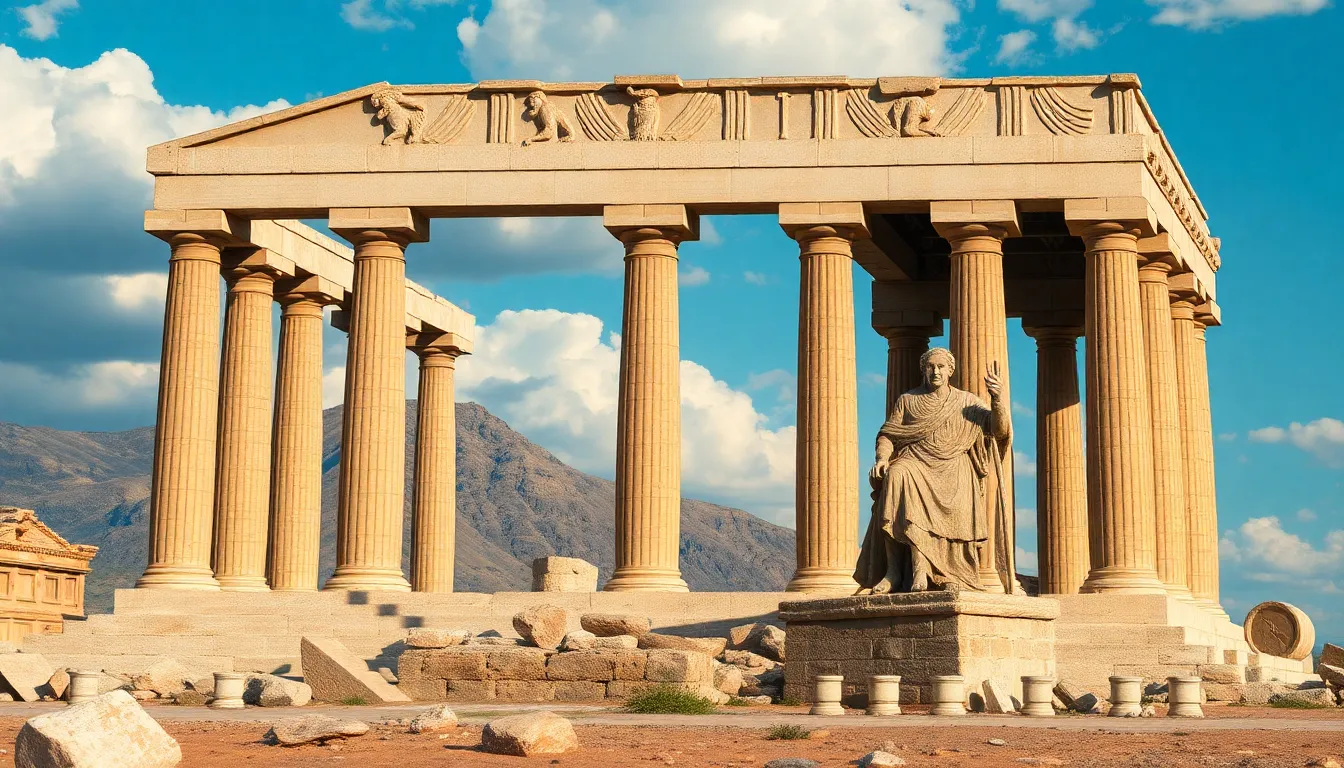10 Surprising Facts About the Theogony You Never Knew
I. Introduction to the Theogony
The Theogony, an epic poem attributed to the ancient Greek poet Hesiod, serves as a foundational text in Greek mythology. It narrates the origins and genealogies of the gods, providing a comprehensive cosmic framework that details the creation of the universe and the rise of divine entities.
Hesiod, who lived in the 8th century BCE, is often regarded as one of the earliest poets in Western literature. His works, including the Theogony and Works and Days, offer insights into the lives, beliefs, and values of ancient Greeks. This article aims to uncover ten surprising facts about the Theogony, shedding light on its significance and the lesser-known elements that contribute to its enduring legacy.
II. The Historical Context of the Theogony
The Theogony was composed during a time when Greek culture was evolving rapidly, transitioning from oral traditions to written literature. This period saw the rise of city-states and the proliferation of artistic and philosophical thought, making it a rich backdrop for Hesiod’s writings.
Within the realm of Greek mythology and literature, the Theogony occupies a pivotal role. It not only serves as a source of mythological narratives but also influences subsequent literary works, including those of Homer and later dramatists. The text’s exploration of divine genealogy laid the groundwork for the structure of many myths that followed.
- The Theogony provided a cohesive narrative that linked various regional myths.
- Its themes of divine conflict and order influenced later Greek tragedies.
- Philosophers and playwrights drew upon Hesiod’s ideas to explore morality and existence.
III. The Theogony’s Unique Structure
The Theogony is characterized by its distinct poetic form, utilizing hexameter verses that convey the rhythm and musicality of ancient Greek poetry. This structure not only enhances the oral recitation of the text but also emphasizes its mythological themes.
The narrative structure of the Theogony is linear yet complex, weaving together various mythological accounts while maintaining a clear chronological progression. This organization is significant as it helps readers understand the relationships and hierarchies among the gods.
Through its unique structure, the Theogony effectively engages the audience, drawing them into a world where chaos gives way to order, and divine lineage determines power.
IV. Lesser-Known Deities Mentioned in the Theogony
While the Theogony is famous for its major deities, such as Zeus, Hera, and Poseidon, it also introduces a range of lesser-known gods and goddesses who play crucial roles in the mythological hierarchy.
Some of these obscure figures include:
- Nyx – the primordial goddess of the night.
- Thanatos – the personification of death.
- Erebus – the embodiment of darkness and shadow.
These deities, though not as prominent in popular mythology, are essential for understanding the complexities of the Greek pantheon and their interconnectedness with other mythological texts.
V. The Concept of Chaos in the Theogony
One of the most intriguing aspects of the Theogony is its treatment of Chaos, described as the primordial void from which all things emerged. Chaos is often interpreted as the first entity, representing a state of disorder before the cosmos took shape.
In the Theogony, Chaos precedes the creation of the universe, giving rise to Gaia (Earth), Tartarus (the Abyss), and Eros (Love). This conception of Chaos contrasts with other creation myths found in different cultures, where creation often arises from a more structured or divine source.
Comparatively, in other traditions:
- In the Babylonian Enuma Elish, creation emerges from the conflict between gods.
- The Judeo-Christian Genesis begins with God creating order from chaos.
The Theogony’s portrayal of Chaos as a necessary precursor emphasizes the theme of transformation and the emergence of order from disorder.
VI. The Theogony’s Impact on Philosophy
The influence of the Theogony extends beyond mythology and literature into the realm of philosophy. Pre-Socratic philosophers, who sought to understand the nature of the cosmos, were significantly shaped by Hesiod’s work.
Theogony offered a narrative framework that helped articulate early cosmological ideas, leading thinkers to explore questions about existence, the nature of the divine, and the origins of the universe.
Some lasting philosophical questions raised by the Theogony include:
- What is the nature of divinity and its relationship to humanity?
- How does chaos relate to order in the universe?
- What role do myths play in understanding human existence?
These questions continue to resonate in contemporary philosophical discourse, illustrating the text’s lasting impact on human thought.
VII. The Theogony’s Representation of Gender
The Theogony presents a complex representation of gender through its portrayal of male and female deities. While many of the most powerful gods, such as Zeus and Poseidon, dominate the narrative, several significant female figures also play crucial roles.
The dynamics of power among the gods often reflect societal views on gender during Hesiod’s time. Key feminine figures include:
- Gaia – the primordial Earth goddess who gives birth to the Titans.
- Rhea – the mother of the Olympian gods, who represents fertility and motherhood.
- Athena – born from Zeus’ head, symbolizing wisdom and strategic warfare.
Despite the notable presence of powerful female deities, the overall hierarchy tends to favor male gods, highlighting the complexities of gender representation in ancient mythology.
VIII. Conclusion: The Enduring Legacy of the Theogony
In summary, the Theogony is a rich and multifaceted work that offers surprising insights into ancient Greek mythology, philosophy, and gender dynamics. The facts discussed throughout this article reveal the depth of Hesiod’s creation narrative and its significant impact on subsequent literature and thought.
Today, the Theogony continues to be relevant, influencing modern literature, art, and philosophy. Its exploration of creation, divine hierarchy, and the nature of existence invites contemporary audiences to reflect on their own beliefs and values.
As we delve into ancient texts like the Theogony, we uncover timeless insights that resonate with our understanding of the world, reminding us of the enduring legacy of these mythological narratives.




